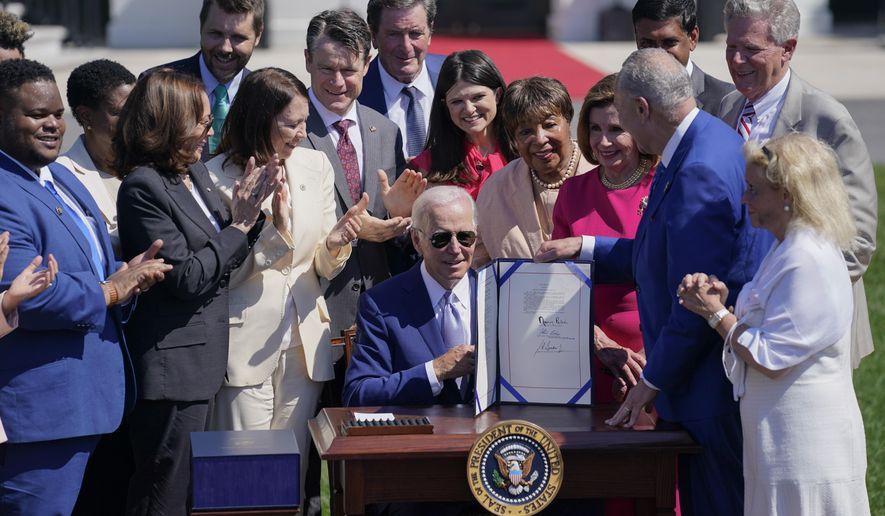President Biden on Tuesday signed Congress’ $280 billion technology spending bill aimed at boosting domestic semiconductor manufacturing and spurring scientific research, lauding it as a “once-in-a-generation investment in America itself.”
“America invented the semiconductor,” Mr. Biden said during a ceremony on the South Lawn of the White House. “And this law brings it back home.”
The House gave final passage to the bill, which includes a $52 billion payout to semiconductor manufacturers, in a 243-187 vote last month, one day after the Senate passed the measure 64-33 in a key legislative win for the administration.
Proponents of the bill, which includes more than $50 billion in the next five years for chip manufacturing and a 25% tax credit through 2026 for new chip production, say it will reduce America’s dependence on China and resolve a major supply chain issue that has contributed to high inflation.
Passage of the bill in the narrowly divided Congress marked a legislative win for the White House and for Democrats hungry for a policy victory ahead of the Nov. 8 midterm elections.
Mr. Biden was joined by Senate Majority Leader Charles E. Schumer, New York Democrat, and House Speaker Nancy Pelosi, California Democrat, and Commerce Secretary Gina Raimondo for the signing ceremony.
Mr. Schumer lauded the Senate’s progress on Democrats’ key legislative priorities in recent weeks, including the semiconductor legislation and the party’s $740 billion health care, climate, tax and spending package passed by the chamber over the weekend. The Senate is divided 50-50, with Vice President Kamala Harris providing the tie-breaking vote.
“All too often, government and businesses are accused of thinking too short term,” Mr. Schumer said. “But this is one of the most significant long-term thinking bills in ages. I firmly believe our grandchildren will work in jobs we can’t even envision now because of these great investments.”
“Today we are laying the foundation for a bold future by enacting the Chips and Science Act,” he said. “We are making clear we believe another great American century lies on the horizon.”
Mrs. Pelosi said by signing the bill, Mr. Biden has “declared our economic independence” and is returning “American semiconductor production to world leadership status.”
The bill’s passage capped months of tense negotiations on the long-stalled $52 billion incentive for chip manufacturers.
The White House had been in a full-court press for weeks to get the measure passed, urging lawmakers to shed a bevy of tough-on-China measures to get the broadly supported semiconductor funding to his desk before industry heavyweights take their money elsewhere.
Ms. Raimondo, who led classified briefings last month on Capitol Hill to compel lawmakers to move the stalled chip funding across the finish line, has warned the U.S. is running out of time to woo chip manufacturers as other countries begin to roll out similar incentives.
“This could not have come at a more urgent moment,” she said during the signing ceremony. “The linchpin of our economy and our national security, and our over-reliance on foreign manufacturers is a real vulnerability. With these investments, that changes right now.”
Without a steady flow of semiconductors, which are used to manufacture a variety of goods such as smartphones, washing machines and advanced weapons, proponents warn that the U.S. will be severely hobbled in maintaining economic stability.
Opponents, including some Republicans and self-described Democratic socialist Sen. Bernard Sanders of Vermont, labeled as “corporate welfare” the bill’s $52 billion of funding for the chip manufacturing industry.
Several semiconductor heavyweights have hinged further investment in the U.S. on the federal subsidies included in the bill.
Micron announced this week that it would spend $40 billion in domestic semiconductor manufacturing, creating 5,000 new high-tech jobs, the Boise, Idaho firm said. Micron says its investment will boost the U.S. share of chip production from 2% to 10% over the next decade.
Qualcomm this week has also agreed to buy $4.2 billion in chips produced from GlobalFoundries’ upstate New York factory. GlobalFoundries is expected to expand its domestic chip manufacturing footprint to benefit from the federal subsidies under the legislation.
• Joseph Clark can be reached at jclark@washingtontimes.com.




Please read our comment policy before commenting.